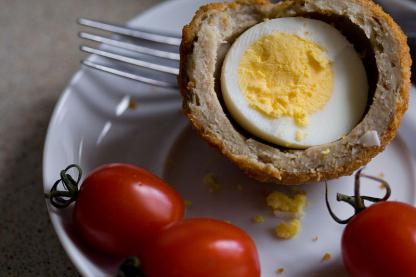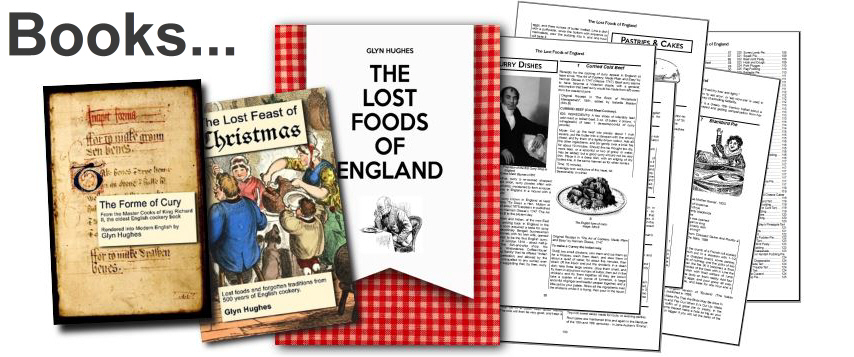

|
 Now an individual whole hard boiled egg wrapped in sausage meat, covered in breadcrumb and deep-fried or baked. Now served universally as a snack item, they were formerly served as part of a meal, hot with gravy.  A Scotch Egg, halved Image: Nic McPhee Historically, ‘Scotch (or ‘Scotched’) Eggs’ can mean two different things. In the 18th and 19th Centuries there was a considerable trade in exporting eggs from Scotland, by coastal ships, to the London markets. These were preserved and toughened for the journey by dipping the whole shell-on egg in boiling water, leaving the eggs semi-hardened, and then packing them dusted with a lime-powder disinfectant, a process known as ‘scotching’. This left them perfectly edible for months, but slightly discoloured. It is possible that the forcemeat covering was developed as an ideal method of serving these sound, but not-so-pretty, ‘scotch eggs’.  The 19th Century Scotch Egg Trade Hampshire Advertiser – Saturday 06 May 1848 The term ‘scotch eggs’ for both the preserved plain eggs and for the sausagemeat savoury was used throughout the 19th Century, which may have led to certain confusions about where and when what was first developed, but meat-enrobed ‘scotch eggs’ are definitively known to us, and to the OED, only since ‘A New System Of Domestic Cookery‘ by Maria Rundell in 1807. Alternatively, the name may not be derived from the name of the country but may be connected with the word ‘scorch’, as, possibly, is ‘butterscotch’, or the dish may be a development of the much earlier Bursews, or be derived from the very similar Dutch ‘eierbal’ or the Indian ‘nargisi kofta’.  Original Receipt from ‘A New System Of Domestic Cookery‘ by ‘A Lady’ (Mrs. Maria Eliza Ketelby Rundell) (Rundell 1807) Original Receipt from ‘A New System Of Domestic Cookery‘ by ‘A Lady’ (Mrs. Maria Eliza Ketelby Rundell) (Rundell 1807)Scotch Eggs Boil hard five pullet’s eggs and without removing the white, cover completely with a fine relishing forcemeat in which let scraped ham bear a due proportion. Fry of a beautiful yellow brown and serve with a good gravy in the dish Puzzlingly, and delightfully, the receipt also occurs as ‘Bird’s Nests’ (with thanks to Vanessa Heggie for spotting it)  Original Receipt from ‘High-Class Cookery Recipes ‘ by Mrs Charles Clarke of the Kensignton National Cookery School (National 1887) Original Receipt from ‘High-Class Cookery Recipes ‘ by Mrs Charles Clarke of the Kensignton National Cookery School (National 1887)Bird’s Nests. Ingredients. Six Eggs (Plover’s are the best). Half a pound of Sausages, or Quenelle Meat. Egg and Bread-crumbs Boil six eggs quite hard, take them out of the shell carefully, and when quite cold mask them all over with quenelle or sausage meat, egg and bread- crumb them and fry them a nice brown. Take them out of the fat, cut them in half with a sharp knife, stand them up on the narrow end, dish them up with tomato sauce round.  Original Receipt in ‘The Book of Household Management‘ edited by Isabella Beeton, 1861 (See Mrs.B) Original Receipt in ‘The Book of Household Management‘ edited by Isabella Beeton, 1861 (See Mrs.B)SCOTCH EGGS. 1666. INGREDIENTS. – 6 eggs, 6 tablespoonfuls of forcemeat No. 417, hot lard,1/2 pint of good brown gravy. Mode. – Boil the eggs for 10 minutes; strip them from the shells, and cover them with forcemeat made by recipe No. 417; or substitute pounded anchovies for the ham. Fry the eggs a nice brown in boiling lard, drain them before the fire from their greasy moisture, dish them, and pour round from 1/4 to1/2 pint of good brown gravy. To enhance the appearance of the eggs, they may be rolled in beaten egg and sprinkled with bread crumbs; but this is scarcely necessary if they are carefully fried. The flavour of the ham or anchovy in the forcemeat must preponderate, as it should be very relishing. Time. – 10 minutes to boil the eggs, 5 to 7 minutes to fry them. Average cost, 1s. 4d. Sufficient for 3 or 4 persons. Seasonable at any time.  |
|
MORE FROM Foods of England... Cookbooks ● Diary ● Index ● Magic Menu ● Random ● Really English? ● Timeline ● Donate ● Royalty ● English Service ● Food Map of England ● Lost Foods ● Accompaniments ● Biscuits ● Breads ● Cakes and Scones ● Cheeses ● Classic Meals ● Curry Dishes ● Dairy ● Drinks ● Egg Dishes ● Fish ● Fruit ● Fruits & Vegetables ● Game & Offal ● Meat & Meat Dishes ● Pastries and Pies ● Pot Meals ● Poultry ● Preserves & Jams ● Puddings & Sweets ● Sauces and Spicery ● Sausages ● Scones ● Soups ● Sweets and Toffee ● About ... ● Bookshop ● Email: [email protected] COPYRIGHT and ALL RIGHTS RESERVED: © Glyn Hughes 2022 BUILT WITH WHIMBERRY |